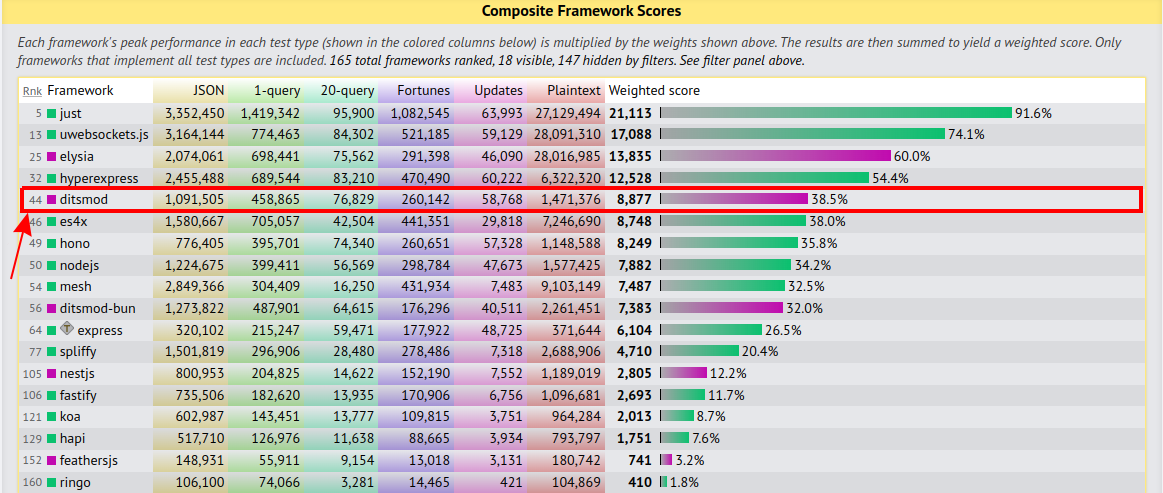What is Ditsmod
Introduction to Ditsmod
Ditsmod is a Node.js-based web framework designed for building highly extensible and fast applications. Its name combines DI + TS + Mod to highlight its key features: it includes Dependency Injection, is written in TypeScript in ESM format, and is designed with strong Modularity in mind.
Key Features of Ditsmod
- Modular architecture with decorators, enabling declarative application structure definition.
- Support for creating custom extensions (sometimes referred to as plugins) that can initialize asynchronously and depend on one another.
- Dynamic module addition and removal after the server starts, without requiring a restart.
- Built-in OpenAPI support with request validation based on OpenAPI metadata.
- As of today, Ditsmod is one of the fastest Node.js web frameworks:

Some architectural concepts in Ditsmod are inspired by Angular, with its DI system built on Angular's native DI module.
ExpressJS vs. Ditsmod
For comparison, the following examples demonstrate the minimal code needed to start applications with ExpressJS and Ditsmod.
import express from 'express';
const app = express();
app.get('/hello', function (req, res) {
res.send('Hello, World!');
});
app.listen(3000, '0.0.0.0');
import { controller, rootModule, Application } from '@ditsmod/core';
import { route, RoutingModule } from '@ditsmod/routing';
@controller()
class ExampleController {
@route('GET', 'hello')
tellHello() {
return 'Hello, World!';
}
}
@rootModule({
imports: [RoutingModule],
controllers: [ExampleController],
})
class AppModule {}
const app = await Application.create(AppModule);
app.server.listen(3000, '0.0.0.0');
Looking at the amount of code, you might think that Ditsmod is slower than ExpressJS because of its verbosity. But in fact, only Ditsmod's cold start is slightly slower (it starts in 34 ms on my laptop, while ExpressJS starts in 4 ms). In terms of request processing speed, Ditsmod is more than twice as fast as ExpressJS.
More application examples are available in the Ditsmod repository, as well as in the RealWorld repository.
P.S. Although a link to the repository with all the necessary settings for Ditsmod applications is provided below, if you choose to use just this code, don't forget to include the following in your tsconfig files:
{
"compilerOptions": {
// ...
"experimentalDecorators": true,
"emitDecoratorMetadata": true
}
}
Prerequisites
Please make sure that Node.js >= v20.6.0 is installed on your operating system.
Installation
The basic set for running the application has a repository ditsmod/starter. Clone it and install the dependencies:
git clone --depth 1 https://github.com/ditsmod/starter.git my-app
cd my-app
npm i
Alternatively, you can use the starter monorepo:
git clone --depth 1 https://github.com/ditsmod/monorepo.git my-app
cd my-app
npm i
Start in Development Mode
You can start the application in development mode with the following command:
npm run start:dev
You can check the server operation using curl:
curl -i localhost:3000/api/hello
Or simply by going to http://localhost:3000/api/hello in your browser.
By default, the application works with info log level. You can change it in the file src/app/app.module.ts or apps/backend/src/app/app.module.ts (in the monorepository).
Thanks to ditsmod/starter's use of the so-called Project References and tsc -b build mode, even very large projects compile very quickly.
Note that there are four config files for TypeScript in the ditsmod/starter repository:
tsconfig.json- the basic configuration used by your IDE (in most cases it is probably VS Code).tsconfig.build.json- this configuration is used to compile the code from thesrcdirectory to thedistdirectory, it is intended for application code.tsconfig.e2e.json- this configuration is used to compile end-to-end tests.tsconfig.unit.json- this configuration is used to compile unit tests.
Also, note that since ditsmod/starter is declared as an EcmaScript Module (ESM), you can use native Node.js aliases to shorten file paths. This is analogous to compilerOptions.paths in tsconfig. Such aliases are declared in package.json in the imports field:
"imports": {
"#app/*": "./dist/app/*"
},
Now you can use it, for example in the e2e folder, like this:
import { AppModule } from '#app/app.module.js';
At the moment (2023-10-13) TypeScript does not yet fully support these aliases, so it is advisable to duplicate them in the tsconfig.json file:
// ...
"paths": {
"#app/*": ["./src/app/*"]
}
// ...
Note that in package.json the aliases point to dist, while in tsconfig.json they point to src.
Start in product mode
The application is compiled and the server is started in product mode using the command:
npm run build
npm run start-prod
Entry file for Node.js
After installing Ditsmod starter, the first thing you need to know: all the application code is in the src folder, it is compiled using the TypeScript utility tsc, after compilation it goes to the dist folder, and then as JavaScript code it can be executed in Node.js.
Let's look at the src/main.ts file:
import { ServerOptions } from 'node:http';
import { Application } from '@ditsmod/core';
import { AppModule } from './app/app.module.js';
import { checkCliAndSetPort } from './app/utils/check-cli-and-set-port.js';
const serverOptions: ServerOptions = { keepAlive: true, keepAliveTimeout: 5000 };
const app = await Application.create(AppModule, { serverOptions, path: 'api' });
const port = checkCliAndSetPort(3000);
app.server.listen(port, '0.0.0.0');
After compilation, it becomes dist/main.js and becomes the entry point for running the application in production mode, and so why you will specify it as an argument to Node.js:
node dist/main.js
Looking at the file src/main.ts, you can see that an instance of the class Application is created, and as an argument for the method bootstrap() is passed AppModule. Here AppModule is the root module to which other application modules then imports.
Ditsmod on Bun
Ditsmod can run on Bun. However, as of version (v1.1.29), Bun has a bug that causes it to work incorrectly with TypeScript. If you download Ditsmod's starter, install the dependencies, and try to run the application:
git clone --depth 1 https://github.com/ditsmod/starter.git my-app
cd my-app
bun install
bun run build
bun dist/main.js
Bun will throw the following error:
1 | (function (entry, fetcher)
^
SyntaxError: export 'ValueProvider' not found in './types-and-models.js'
At the moment, this bug can be worked around by removing the tsconfig.json files from all Ditsmod packages:
rm node_modules/@ditsmod/*/tsconfig.json
Additionally, if your application has compilerOptions.paths configured in tsconfig.json, Bun will also malfunction. Simply comment out or remove this section from tsconfig.json. Afterward, you need to run the compiled version of the entry file:
bun dist/main.js